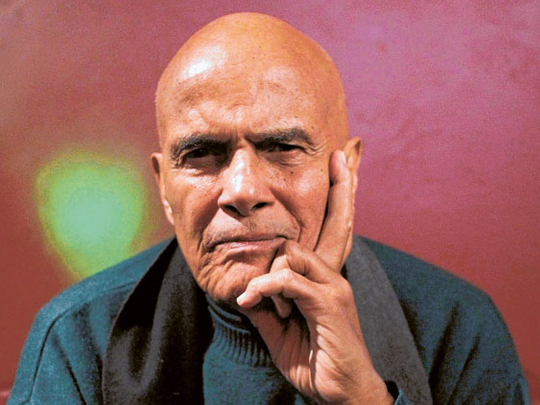
At age 83, his days of singing calypso tunes to thousands of fans are behind him, but Harry Belafonte says he still has one song to sing for people around the world — his song of justice.
Belafonte is at the Sundance Film Festival this week with a new documentary, Sing Your Song, that tells of his life from being born in Harlem and raised in Jamaica to becoming a star singer of the 1950s and '60s with hits such as Banana Boat Song, also known as Day-O.
But what the nonfiction film focuses on — and what Belafonte thinks may be lost on some people, especially younger generations — is the work he and others did to advance civil rights and justice in the United States and around the world.
Asked what he believed his song was, at 83, Belafonte's answer was: "The same melody. It just needs to be sung again. What it needs are more voices of harmony. It's a beautiful chord that everybody gets to sing in the same place at the same time with the same purpose. The song is the same: justice."
Sing Your Song was among the opening night films last Thursday at Sundance, the premiere US festival for makers of movies outside Hollywood's mainstream studios.
The event, which is backed by actor and activist Robert Redford's Sundance Institute, has long been a place where independent filmmakers screen movies, and much of their work deals with social issues, so Sing Your Song fit perfectly.
In fact, on opening night festival director John Cooper said, "at our core, the life of Harry Belafonte and Sundance are almost intertwined."
CHALLENGING MYTHS
But Belafonte admitted to some trepidation about making a documentary of his life when approached by producer Michael Cohl because, he said, "it looked like self-indulgence."
He was swayed by family members and by his own concern that the groundbreaking history of women and men like Dr Martin Luther King, was lost on a younger generation.
"What I looked at were the [issues] of the day and the absence of people being inspired and fueled to take charge and take responsibility for changing," Belafonte said.
"The great void that I hear expressed by people who say, ‘I don't know what to do' or ‘there's nothing we can do' must be challenged. And the best way to challenge that myth is to say, ‘take a look at the history that proceeded you.'"
Sing Your Song traces Belafonte's career as a singer and in movies and on television. He was a major star of his generation, yet in the late 1950s and 1960s when traveling to segregated US cities, he was barred from some restaurants, hotels and other public places because he was black.
The documentary tells how he fought racism in very public ways by marching with civil rights protesters such as Dr King and singing and dancing with white women on TV at a time when such a thing was not done in some communities.
In the 1970s and '80s, Belafonte extended his influence to the anti-apartheid movement in South Africa, and was instrumental in distributing the song, We Are the World, which raised money to help feed people around the globe.
"I don't think you can get into a place of activism on [civil rights] and not understand how it is related to all the other struggles. You might be able to fix your neighborhood for the moment, but you're just in a neighbourhood. Look at the community, look at the larger problem, look at the world."
But two things are still true about Belafonte while watching and listening him at Sundance. His vision is as clear as ever, and his voice is still strong.











